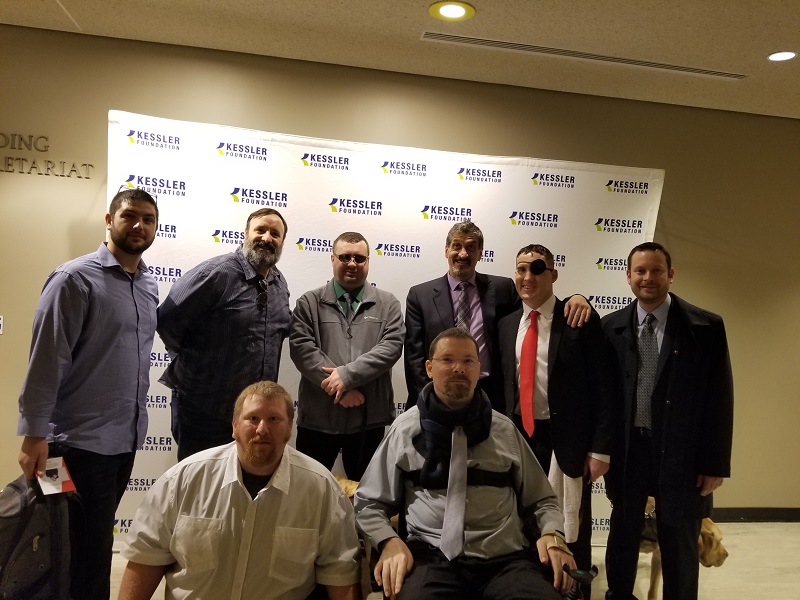By Albert J. Rizzi, M.Ed.
Regardless of circumstance, everyone should be able to use an organization’s main entrance. When the Civil Rights Act closed the door on the concept of “servants’” entrances and separate accommodations for African Americans and other minorities, it opened doors to people of all abilities and walks of life to rise to heights never dreamt of. Americans of all races, genders, orientations and faiths have taken their rightful places in our schools, workforce, and government. However, the disability community is still being forced to use alternate entrances in life. In 2018, people with disabilities are still struggling to be celebrated and included in our corporate and social cultures. In large part, this is because virtual and physical main entrances in life are still barred to us in the 21st Century.
December 3rd was the International Day of Persons with Disabilities. My Blind Spot gathered with other global leaders, dignitaries, advocates, and accessibility professionals, many of whom have a disability, to champion authentic inclusion and digital equity for the 1.4 billion people around the world living with a disability. One way to absolutely ensure authentic inclusion is to build digital equity and inclusive design into the technology and software programs that everyone uses in their daily lives, including people with disabilities.
Unfortunately, in an effort to cut overhead and maximize revenues, many corporations neglect maximizing their investments in technology, ignoring the usability and functionality of internal and external digital offerings. Doing so unintentionally blocks a market of people as large as the population of China from navigating their websites, mobile apps, digitized communications and other technologies.
C-suite executives around the world place little importance on or simply ignore how access to technology unlocks a myriad of possibilities for people with disabilities. They demand the disruptive, innovative approach to building revenues and return on investment (ROI). They claim to want innovative problem solvers to maximize resources and investments to grow their bottom lines. At times, leaders unfortunately opt to take the easy way out when it comes to digital offerings, barring their loyal customers aging into the disability community, and potential new consumers and employees who already have a disability, from enjoying equitable access to all things.
Scandinavian Airlines learned that lesson at a huge cost. After reading “Scandinavian Airline Fined over Alternate Site for Disabled” as published in Law360, I just shook my head, and thought, “Here is another corporation that got incorrect advice on how to do digital inclusion right”. The airline learned that blocking their consumers with a disability from using the main entrance to their virtual offices was in a word, illegal. The Department of Transportation (DOT) fined the airline $200,000 for operating an alternate website for passengers with a disability as opposed to allowing them to use the main entrance to their website. What it seems Scandinavian Airlines did not know, based in part on the advice of the company they hired to bring their website into compliance, was their solution violated federal law and DOT regulations.
Newsflash: There is no shortcut to maximizing the usability and functionality of technologies short of improving the code at the platform levels.
That code needs the expert eyes of stakeholders in the outcomes by Certified Professionals in Accessibility Core Competencies (CPACC) who themselves are reliant on assistive devices and represent the full spectrum of modalities, abilities and ages.
My Blind Spot created our niche offerings of digital accessibility, usability testing, and remediation services based upon the mandates of the federal government and the DOT. Our focus in advocating for digital equity and true inclusion is rooted in exceeding those minimal standards thus ensuring our client’s digital offerings are usable and functional for all. As an internationally certified accessibility consultancy recognized by the International Association of Accessibility Professionals, My Blind Spot is dedicated to opening access to digital platforms that promote the abilities in all of us, while creating infinite possibilities in the lives of hundreds of millions of people.
Unless your “accessibility” firm has a significant representation of CPACC professionals with considerable experience in accessibility testing and remediating your digital offerings, you run the risk of becoming the next Scandinavian Airlines, Target, or Bank of America.
Digital equity and universal design are something every organization needs to commit to in the 21st century; there is no way around it. Simply put, authentic digital inclusion, aside from being the law and the right thing to do, simply makes good business sense on so many levels. It is certainly better in the long run to use a certified, recognized firm that adheres to the national and international regulations governing digital equity and inclusion. Those hundreds of thousands of dollars in fines would be better used investing into your brand and market base.
My Blind Spot works across industries, public and private sectors and with organizations of all shapes and sizes, guiding them on solutions for authentic inclusion that reduce their risk to litigation, rewarding their loyal consumer base, while opening avenues to the largest untapped market base in the world. Not baking digital inclusion into the design and development process just ends up costing corporations more in terms of money and diminished reputation. There is one thing we tell our partners, or anyone that will listen for that matter: Never follow the guidance of purported accessibility professionals that are not advocating for authentic inclusion but are focused on only selling a widget. At My Blind Spot, we believe it is important to not merely meet, but exceed federal regulations when it comes to inclusive design. We are an internationally certified nonprofit focused on inspiring accessibility for people of all abilities and consider digital equity a nonnegotiable concept that makes good business sense.
#DontDisMyAbility
#AccessAbility
Additional Notes
Please note that in order to read the article “Scandinavian Airline Fined over Alternate Site for Disabled” you may have to register for a Law360 account.
